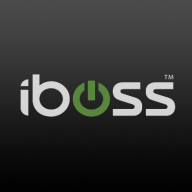


Find out what your peers are saying about Zscaler, Palo Alto Networks, Cisco and others in ZTNA as a Service.
| Product | Mindshare (%) |
|---|---|
| Cato SASE Cloud Platform | 11.1% |
| iboss | 2.4% |
| Twingate | 2.3% |
| Other | 84.2% |

| Company Size | Count |
|---|---|
| Small Business | 6 |
| Midsize Enterprise | 6 |
| Large Enterprise | 6 |
| Company Size | Count |
|---|---|
| Small Business | 14 |
| Midsize Enterprise | 7 |
| Large Enterprise | 11 |
Iboss offers a comprehensive cloud-based security platform valued for its scalability and autonomous features, ensuring robust security with easy deployment and management capabilities.
Renowned for its robust security architecture, Iboss integrates seamlessly within diverse networks, delivering efficient granular filtering and advanced content categorization. Its single pane of glass console provides ease of management, allowing rapid scalability suitable for rapidly deploying environments. Operates in BYOD setups due to inline filtering without device installation. Integration with cloud-based applications enhances user control, and features like SASE, SSL inspection, and ChatGPT risk protection stand as highlights. Despite its strengths, users have pointed out areas for enhancement like direct navigation in reports, SSL decryption, and better cloud integration while having room to improve data loss prevention.
What are the most important features of Iboss?The usage of Iboss spans educational institutions, specifically K-12, to enforce internet policies, protect data, and support remote work environments. It provides web filtering and security frameworks to ensure safe browsing. Its platform-as-a-service model offers flexibility for both cloud-based and on-premises requirements, integrating seamlessly to deliver enhanced security features suitable for various deployment needs including zero trust, CASB, and network security for work-from-home setups.
Cato Networks is a leading SASE (Secure Access Service Edge) platform, combining SD-WAN and network security to obtain a cloud-native service. Cato Networks optimizes and secures application access for users and identities. The platform delivers a next-generation secure networking architecture that minimizes legacy IT infrastructures’ complexity, costs, and risks. The goal of Cato Suite is to connect any user to any application securely and optimally.
Cato Suite runs on a private global network of more than 65 PoPs (points of presence) connected via SLA-backed network providers. The service can connect branches, data centers, users, and clouds. Cato can be deployed in stages to augment legacy network services.
Cato Suite delivers end-to-end route optimization for WAN and cloud traffic. The architecture is self-healing, enabling a high service uptime.
Cato Features
Cato Cloud has a global backbone to deliver a reliable, global network. Here are some key SD-WAN features of Cato Cloud.
What challenges does Cato Network solve?
MPLS (multi-protocol label switching) networks are usually expensive and limited in their capacity. Cato simplifies migrating to a faster, higher-capacity internet and SASE cloud. Cato SD-WAN appliances enable customers to improve usable capacity and resiliency.
Customers who suffer from the challenge of high latency and network inconsistency can use Cato to deliver a consistent connection and user experience to access on-premises and cloud applications.
Cato’s complete network security stack connects all branch locations to the Cato cloud, therefore protecting all traffic, both internet-bound and WAN, with enterprise-grade, cloud-based security services. This capability avoids having to backhaul internet traffic to a data center or hub or having to implement stand-alone cloud security solutions.
Organizations using Cato notice an acceleration of cloud traffic. Cato achieves this by routing all traffic from the edges to the PoP closest to the data center. Because of the close distance between the two, the latency is near zero.
Reviews from Real Users
An IT manager/project coordinator at a healthcare company says that “[Cato is] a cloud-based solution that integrates well with everything. They are the classic SaaS solution.”
Yeong-Gi L., a network engineer at Snetsystems, notes that “The solution is very stable. The scalability is quite good. Technical support was always helpful and responsive. The integration capabilities are not a problem at all.”
"The most valuable feature is that it also works as a next-gen firewall because it has security features," says Lorenzo S., senior solutions consultant Lead at MDI.
Twingate is a cloud-based network security platform that offers secure, zero-trust access to corporate applications and resources. Its primary use case is to provide remote access to employees, contractors, and partners, allowing them to work securely from anywhere. Twingate's most valuable functionality is its ability to create secure access policies based on user identity, device, and network context. This enables organizations to enforce granular access controls, reducing the risk of data breaches and insider threats.
By leveraging Twingate, organizations can improve their security posture and reduce the IT burden of managing traditional VPNs. It also helps organizations to comply with regulatory requirements, such as GDPR and HIPAA, by providing a secure and auditable access solution.
We monitor all ZTNA as a Service reviews to prevent fraudulent reviews and keep review quality high. We do not post reviews by company employees or direct competitors. We validate each review for authenticity via cross-reference with LinkedIn, and personal follow-up with the reviewer when necessary.